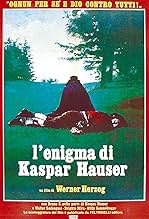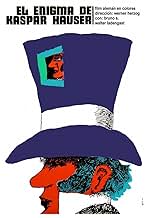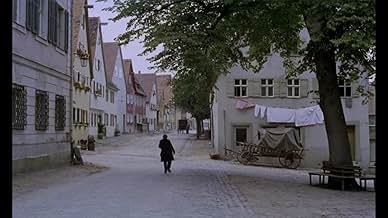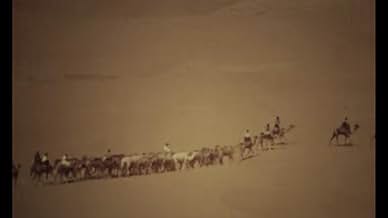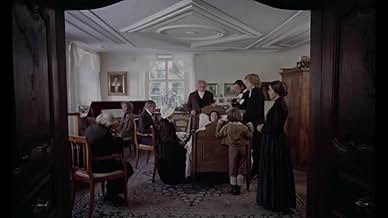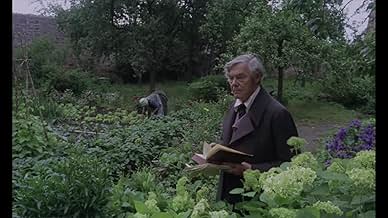AVALIAÇÃO DA IMDb
7,7/10
20 mil
SUA AVALIAÇÃO
Um jovem chamado Kaspar Hauser aparece subitamente em Nuremberg em 1828, dificilmente consegue falar ou andar, e tem uma nota estranha.Um jovem chamado Kaspar Hauser aparece subitamente em Nuremberg em 1828, dificilmente consegue falar ou andar, e tem uma nota estranha.Um jovem chamado Kaspar Hauser aparece subitamente em Nuremberg em 1828, dificilmente consegue falar ou andar, e tem uma nota estranha.
- Direção
- Roteiristas
- Artistas
- Prêmios
- 5 vitórias e 3 indicações no total
- Direção
- Roteiristas
- Elenco e equipe completos
- Produção, bilheteria e muito mais no IMDbPro
Avaliações em destaque
It's a well known philosophical conundrum, would a man be able to think (or even be properly considered a man) if he was denied all sensory stimulation? In Nuremburg in 1828, there was a practical test of this proposition, when a person was discovered in town who had spent all his previous life incarcerated and denied human contact. He was duly taught how to think; but in fact, was not grateful for the experience. Werner Herzog's film examines the strange life of Kaspar Hauser - I find it hard to say whether or not I consider it a good film, because that life itself was so strange. Certainly it better recreated the bafflement of those who interacted with Kaspar than it managed to suggest what it really felt like to be Kaspar - but then, who could know? It's probably not Herzog's greatest achievement - but it's certainly an intriguing subject.
A truely visionary work!!I have always been fascinated with the story that this film tells.Herzog seems to be an expert at showing the way that an outsider relates to the world.Bruno S. is amazing in the lead role , Herzog has definitely made the right casting choice.the movie is just a must for all fans of cinema,even if your not a Herzog fanatic you will still be moved by this extraordinary vision!!!
Werner Herzog's films reach emotional and aesthetic levels that few directors can aspire to. As one of the rare film-maker's more concerned with the artistry of their work than what they achieve at the box office, Herzog is nearly peerless in his purity and ideosynchrasy. Herzog uses the film medium as a moving canvas upon which he expresses, affects, and creates nightmares and dreamworlds which are so vividly real that they threaten our own naturalized consciousness of the projection we call reality.
So much for the postmodern gobbledygook. As you can tell, I love Herzog.
This early film deals with many of the familiar elements that tend to permeate Herzog's films - cultural critique, the insanity of everyday life, alienation, cruelty and power. But here, Herzog uses a true story of 19th century Europe as a vehicle, and treats his subject with an unusual compassion and straightforwardness.
Herzog's incredible casting talent also shows here, just as it does in all of his films. I do not wish to take anything away from the great performers, but really, how does one manage to choose an actor whose life experience is broadly similar to that of Kaspar Hauser's without knowing of it beforehand? This film blends somewhat disjointed artistic imagery with the true story of Kaspar Hauser, a man apart from society who has been kept in a cellar all of his life, and is suddenly expelled into the light in Nuremburg. He is adopted by a kindly old gent who attempts to socialize him in what appears to Kaspar (and perhaps to us through the film's clear vision) an insane society full of lies and contradictions. All of this is done with the believability that is so consistent in Herzog's theatricality, and the visual quality that qualifies him as a true cinematographic artist.
So much for the postmodern gobbledygook. As you can tell, I love Herzog.
This early film deals with many of the familiar elements that tend to permeate Herzog's films - cultural critique, the insanity of everyday life, alienation, cruelty and power. But here, Herzog uses a true story of 19th century Europe as a vehicle, and treats his subject with an unusual compassion and straightforwardness.
Herzog's incredible casting talent also shows here, just as it does in all of his films. I do not wish to take anything away from the great performers, but really, how does one manage to choose an actor whose life experience is broadly similar to that of Kaspar Hauser's without knowing of it beforehand? This film blends somewhat disjointed artistic imagery with the true story of Kaspar Hauser, a man apart from society who has been kept in a cellar all of his life, and is suddenly expelled into the light in Nuremburg. He is adopted by a kindly old gent who attempts to socialize him in what appears to Kaspar (and perhaps to us through the film's clear vision) an insane society full of lies and contradictions. All of this is done with the believability that is so consistent in Herzog's theatricality, and the visual quality that qualifies him as a true cinematographic artist.
Even if this film had failed on the level of character or narrative (which it doesn't), I would still love this movie for its incredible imagery. The memory/dream sequences are haunting and will never leave my head. The opening shot of a field, long blades grass bowing under the wind to the music of Pachelbel, is extraordinary. And of course there's the performance of Bruno S, the most intensely hypnotic and genuine performance you will ever see.
But my favorite scene is of the impresario and the dwarf king and his kingdom. This is a true Herzog moment -- bizarre but somehow still a moment of striking epiphany -- the dwarf a parallel, isolated soul to Kasper's own isolated, lonely soul. The extremity and weirdness of moments like these seem commonplace and everyday in a Herzog film, and therefore somehow commonplace and everyday even in our own lives.
But my favorite scene is of the impresario and the dwarf king and his kingdom. This is a true Herzog moment -- bizarre but somehow still a moment of striking epiphany -- the dwarf a parallel, isolated soul to Kasper's own isolated, lonely soul. The extremity and weirdness of moments like these seem commonplace and everyday in a Herzog film, and therefore somehow commonplace and everyday even in our own lives.
"This is the story of a soul", someone said and I agree because loneliness is here described through a slow moving plot and endless silences which make us see Kaspar Hauser not as a man but as something more sulfuric, almost a being from outer space. The performance of Bruno S. is simply moving and caused me a lot of tears and the use of time through the narration is perfect for a film of this kind. The poetic vision of Werner Herzog is very peculiar and unique and you can love it or hate it but you cannot ignore it. Herzog doesn't care about the audience, he tells what it wants in the way he likes and that's the praise and the defect of European cinema and it's what makes the difference between European authors and American ones.
Você sabia?
- CuriosidadesTo perform the scene in which Kaspar learns to walk, actor Bruno S. knelt for three hours with a stick behind his knees until his legs were too numb to stand.
- Erros de gravaçãoIn a brief scene we see a stork eating a frog with its legs tagged (ringed), but bird ringing didn't start until the end of the nineteenth century, decades after the life of Kaspar Hauser.
- Citações
Opening caption: Do you not then hear this horrible scream all around you that people usually call silence.
- Cenas durante ou pós-créditosOpening credits prologue: One Sunday in 1828 a ragged boy was found abandoned in the town of N. He could hardly walk and spoke but one sentence.
Later, he told of being locked in a dark cellar from birth. He had never seen another human being, a tree, a house before.
To this day no one knows where he came from - or who set him free.
Don't you hear that horrible screaming all around you? That screaming men call silence?
- ConexõesFeatured in Was ich bin, sind meine Filme (1978)
- Trilhas sonorasCanon in D major
Composed by Johann Pachelbel
Principais escolhas
Faça login para avaliar e ver a lista de recomendações personalizadas
- How long is The Enigma of Kaspar Hauser?Fornecido pela Alexa
Detalhes
- Data de lançamento
- País de origem
- Idioma
- Também conhecido como
- The Enigma of Kaspar Hauser
- Locações de filme
- Croagh Patrick, Westport, Mayo, Irlanda(archive footage)
- Empresas de produção
- Consulte mais créditos da empresa na IMDbPro
Bilheteria
- Faturamento bruto mundial
- US$ 3.451
- Tempo de duração
- 1 h 50 min(110 min)
- Mixagem de som
- Proporção
- 1.66 : 1
Contribua para esta página
Sugerir uma alteração ou adicionar conteúdo ausente


